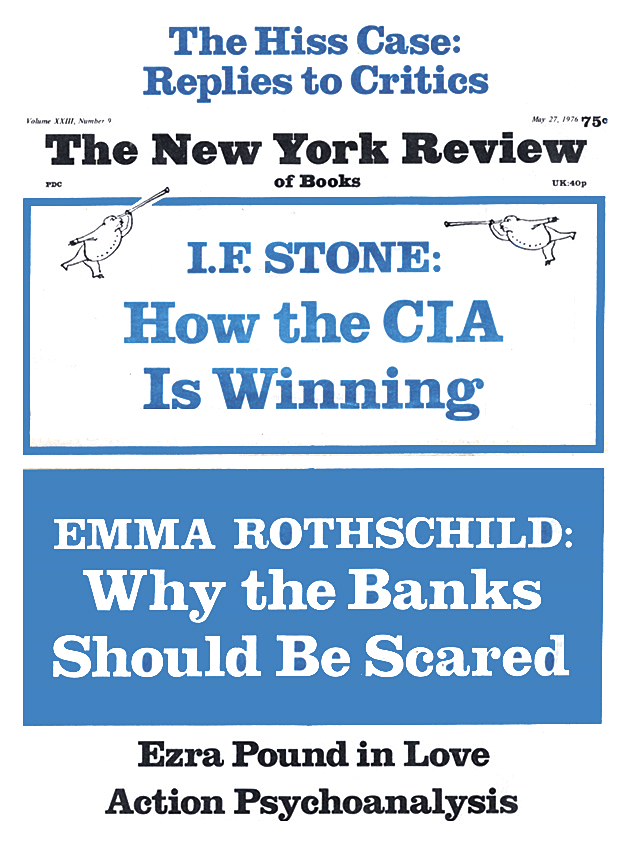In response to:
Conspiracy of Silence from the November 27, 1975 issue
To the Editors:
Joseph Cohen accuses me [Letters, NYR>, November 27] of being party to “the long-standing conspiracy of silence surrounding [Wilfred] Owen’s sexual proclivities.” His conspiracy theory has been longstanding since he advanced it in 1965 as, it would seem, the only possible explanation of the late Harold Owen’s refusal to give him access to his brother’s papers for a projected biography.
His article, “Owen Agonistes,” makes frequent reference to this “conspiracy” but arouses expectations of indictment, revelation, only to disappoint them:
Since Wilfred committed no perverse act there is no specific information for Harold to withhold….
Keeping in mind that religious and literary restraints existed to prevent Owen’s becoming a practicing homosexual, we may confirm his inverted development by identifying and documenting the following elements in turn: overattachment to the mother accompanied by estrangement from the father; narcissism; injustice-collecting; rejection of women; and transference of affection to male equivalents.
Of these six elements all but one are documented in Harold Owen’s Journey from Obscurity, which Mr. Cohen read in typescript for an American university press and used as the basis for his article; and all but one have been the small change of critical discussion of Owen’s poetry since the publication of Harold Owen’s trilogy and the Collected Letters that he edited with John Bell.
The extra element identified and fearlessly brought to light by Mr. Cohen is “injustice-collecting.” Of this he writes:
The injustice-collector is said to find satisfaction in defeat, humiliation, privation, and depression. Self-pity is fundamental. In his youth, Owen propelled himself towards situations filled with despair….
The slings and arrows of peacetime, partly self-inflicted by Owen, nurtured his sensitivity towards suffering and injustice. When he entered the war it was only natural that he would respond to the horrors of the Western Front, almost in a sense of negative fulfillment. Practically all of his best known trench poems can be legitimately read as studies in injustice-collecting….
Homosexuals, whether inverts or perverts, it should be observed have no monopoly on injustice-collecting. Heterosexual injustice-collectors are found throughout all levels of society.
Mr. Cohen says that my “reasons for ignoring his work [in my biography of Owen] are obvious.” I think this quotation from his work—embodying its major contribution to the critical discussion of Owen’s poetry—will make my reasons even more obvious. He indicts me, further, for ignoring Robert Graves’s observation in the first American printing of Goodbye To All That that Owen was “an idealistic homosexual with a religious background.” Paradoxically, he invokes the support of Professor Paul Fussell, who devotes a whole section of his excellent book, The Great War and Modern Memory, to demonstrating that the Graves of Goodbye To All That is to be enjoyed as a tall story-teller rather than trusted as a witness.
However, what Mr. Cohen’s cloudy accusations seem to imply is that in my biography I “conspired”—with whom?—to suppress evidence—of what? Of Owen’s latent homosexuality? It can hardly be more, since he elegantly asserts (on what evidence he does not reveal) that “Wilfred committed no perverse act.” This subject is discussed at several points in my book; a good deal of fresh evidence is there presented and its implications discussed. No evidence was knowingly withheld. If Mr. Cohen has found evidence, factual evidence, of Owen’s “perverse acts” or perverse thoughts or perverse writings, let him present it.
So with the question of Owen’s alleged “cowardice”: having examined the civil and, more importantly, the military sources, I reached a conclusion and set out my reasons. If Mr. Cohen has fresh evidence, factual evidence, let him present it, and everyone interested in Owen will be in his debt.
Let him Waste no more time, however, denouncing as “conspirators of silence” those who seek to spare him the embarrassment of quotation from an unfortunate article. He might be thought an injustice-collector and we all know, now, what that means.
Jon Stallworthy
Oxford, England
This Issue
May 27, 1976


